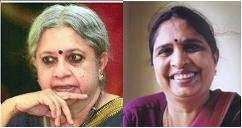Contribute
| Education For All: A Reality In India? |
Arvind Giridhar Saraf
06/13/2004
Association for India's Development (AID) Boston hosted Dr. Vasanthi Devi and Shantha Sinha at its forum titled "Education for All: A Reality in India?" on May 22nd. Dr. Vasanthi Devi, a former Vice Chancellor of Manonmaniam University, is currently the Chairperson of the TamilNadu State Commission for Women. Shantha Sinha is the founder
of the MV Foundation and a Professor in the Department of Political Science at the Hyderabad Central University. They both talked on different aspects of bringing education can brought to the poor in India.
Dr. Devi said that, contrary to popular belief, poor in India do want to send their children to school, but if anything, they can only afford government schools. The quality of education in most government schools is deplorable. So the poor families often don't find the
expenses justifiable and opt to pull their children out instead. The children of the educated and better off people go to more expensive private schools instead, and thus, these parents have an interest in making sure that the quality of education doesn't degrade.
She argued for the need for a Common Schooling Programme or the Neighbourhood School System in India. The Common School System means that every neighbourhood would have a good Government school attended by all the children of that neighborhood. The educated parents of that neighborhood now have an interest in well-being of the school, keeping
the quality up. In a sound neighbourhood school, rich and poor students both would get good education, thus helping even out differences of class and caste.
A position paper on the concept of a Common School System was presented by members of the National Alliance for Fundamental Right to Education (NAFRE), India, early last year.
Mrs Sinha too denounced the myth of poor parents not wanting to send their children to schools. On the other hand, they are willing to make any number of compromises to get their children a decent education (she showed a movie showing many such cases). Lack of confidence among poor parents regarding sending their children to school and general belief that its ok for poor children to work is preventing them.
MV Foundation, founded by her, works to free child labor (defining it to be all children out of school) and send them to fulltime formal schools. The key elements of the work involves first establishing the norm that no child must work, and then reaching out to working children, organizing short (a few months long) camps and motivation centers to get them back to school. Local youth are actively involved
in giving the parents the confidence, involving the panchayats, mobilising the community, and forming the rights protection forums. MV foundation has now impacted over 6000 villages (mostly in Andhra
Pradesh) and mainstreamed about 264000 children.
It was interesting to hear two different perspectives of the same
problem -- Dr Devi saw it primarily as a supply problem wherein the
quality of education had to be improved to make it reach the poor,
while Mrs Sinha emphasized the need for generating the demand from it
even the poorest.
Mrs Sinha's much more detailed presentation can be found at
http://web.mit.edu/aid-boston/www/talks/shantha-sinha/MVF.ppt
Please feel free to contact me (arvind_s@mit.edu) for the video.
You may also access this article through our web-site http://www.lokvani.com/

Vasanthi Devi and Shantha Sinha